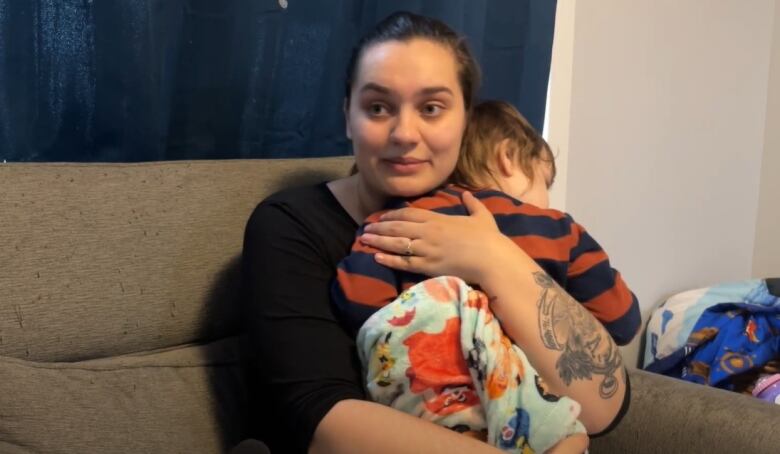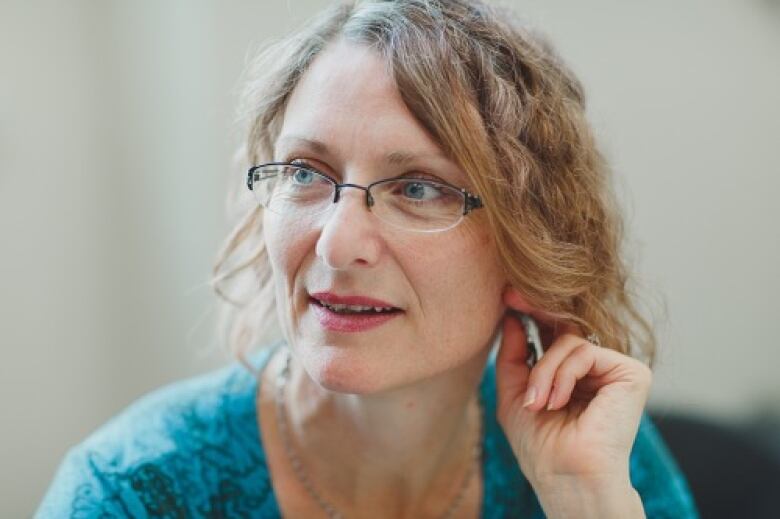Mother of sons with autism says respite, other specialized services lacking in rural Manitoba
'I see my son desperately needing these services, and he's not getting it,' says Shilo mom

A mom whomade a move from Ontario to southwestern Manitoba with her family, hoping they'd have access tobetter support for their neurodiverse children, saysthey've found those services lacking in rural Manitoba.
Ali Puumala has three sons under the age of sevenwho need different levels of support, because they all have autism spectrum disorder and require different levels of 24-hour care.
Her youngest son, three-year-old Carson, has severe non-verbal autism andglobal developmental delay. He's alsobeing tested for cerebral palsy.
For Carson, a hard day includes a lot of screaming and crying because he can't talk, he tries to bite, pinch and pull as a way to communicate, Puumala says. He gets overstimulated easily, so they've built a special sensory space and have different techniques to help him feel calm.
He needs different therapies and treatments, along with a lot of one-on-one time with Puumala or her husband.
"It's frustrating because I see my son desperately needing these services, and he's not getting it," Puumala said. "I'm forced to become his therapist. I'm no longer like I'm his mom because we can't access the programs he needs."

Puumala's husband is in the military, and thecouplearranged a transfer to CFB Shilo lastSeptember to be close to family and get some extra help looking after their children. The base is located about 30 kilometres east of Brandon, where they access treatments like physio, occupational and speech therapy for their children.
Puumala says one of the things that would help them most right now is respite care which involves a trained worker who can support each child and help them and more autism resources.
She's debating opening a sensory gym and a respite centre on her own, because those resources are badly needed outside of Winnipeg.
While they can get physio, speech and occupational therapy in Brandon, they have to travel toWinnipega round trip of about six hoursto see specialists or access other services for their kids. Respite care would helpwhen she hasto take her children to those essential medical appointments, she said.
But it's difficult to secure respite because they live outside a major centre. The family is on a waitlist for funded respite butthey don't know how long it will take to get help, said Puumala.
"There's a lot of families who can't afford to take the time off to sometimes be in Winnipeg for a whole week just for appointments," shesaid.
"We're very lucky he's [her husband] in the military and is able to provide for us. But we're kinda the exception."
Respite funding 'doesn't necessarily mean' getting worker
Alyssa Wiebe, the program manager for rural services with the non-profitManitoba Possible (formerly the Society for Manitobans with Disabilities) says even if a family is approved for funding for a certain number of hours of respite care, a shortage of workers means they may not be able to get it.
"You can get the funding, but that doesn't necessarily mean you're going to get a respite worker," Wiebe said.
It'sgetting to the point where some families are arranging their own contracts forrespite, she said.

Finding respite for kids with exceptional care needs can also be challenging, said Wiebe, sincea respite worker might need special training and become more expensive.
Wiebe says Manitoba Possible is trying to make the search for respiteeasier, including the recent launchCare Possible, an online service thatconnects support workers with people who needrespite or other home-care service.
In an emailed statement, a provincial spokesperson said Children's Disability Services uses a family-centred approach to evaluate respite care needs. There are a range of respite options available, including self-managed respite, through the Families Departmentor community service providers, the spokesperson said.
But Patty Douglas, a Queen's University associate professor and adjunct professor at Brandon University who specializes in disability studies, says withresourcescentralized in Winnipeg, it's not uncommon for rural Manitoba families to face long waitlists.

She has heard many stories where one parent might have to stop working, or a single parent is unable to work because respite isn't available.
"At the end of the day, I think families need resources and they need to be able to allocate them," Douglas said.
Puumala says her three-year-old, Carson, will soon be attending a new preschool two days a week with a one-on-one support worker. Butthey still facegaps in otherspecialized care, she said.
"I find people forget Brandon, the city. Like, we're the second major city in this province, but we're treated as if we're a small town," Puumala said.
"We don't have any of the amenities of a city that we should."













_(720p).jpg)


 OFFICIAL HD MUSIC VIDEO.jpg)
.jpg)



























































































